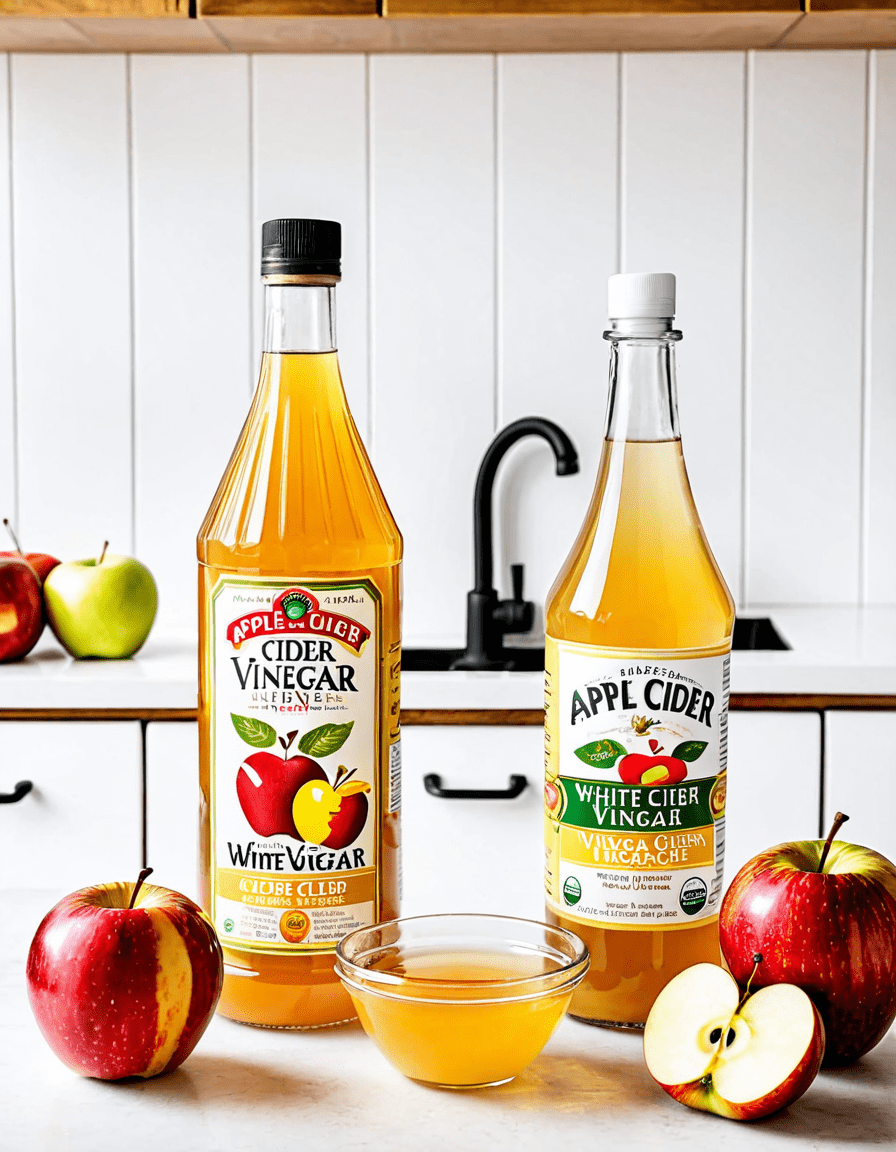When it comes to the great debate of apple cider vinegar vs white vinegar, pet owners and everyday cooks alike have a lot of questions. Each type of vinegar has its own set of characteristics, culinary uses, and potential health benefits. But what sets them apart? Let’s explore the nutritional differences, health benefits, culinary applications, environmental impacts, and pet safety considerations to help you make an informed choice.

1. Nutritional Differences: Apple Cider Vinegar vs White Vinegar
Nutritional Profile of Apple Cider Vinegar
Apple cider vinegar (ACV) is derived from fermented apples and boasts a few more perks than its clear counterpart. One tablespoon of ACV contains approximately 3 calories and offers trace amounts of potassium, which can be beneficial for your health. This slight nutritional advantage stems from the natural antioxidants in apples, potentially boosting overall well-being.
White Vinegar’s Minimal Value
In contrast, white vinegar, which is predominantly made from grain alcohol or synthetic sources, lacks significant nutritional value. It doesn’t pack any calories or nutrients, making it a one-note player in this vinegar showdown. If you’re looking for a nutrient-rich addition to your diet, ACV clearly takes the prize here. So, if your aim is to enhance your nutritional intake, apple cider vinegar vs white vinegar inclined choices favor ACV, hands down.
A Quick Recap

2. Health Benefits of Apple Cider Vinegar vs White Vinegar
2.1 Potential Health Benefits of Apple Cider Vinegar
Apple cider vinegar is often celebrated for its potential health benefits. Some studies suggest it can aid in weight management by making you feel fuller longer and helping regulate blood sugar levels. In a clinical trial highlighted in the Journal of Functional Foods, those who consumed ACV daily reported more stable blood sugar levels post-meal, which is particularly appealing for those with insulin sensitivity issues.
2.2 White Vinegar: A Different Approach
On the flip side, white vinegar isn’t just a kitchen staple for nothing. While it’s not typically associated with health benefits, its antimicrobial properties make it useful for cleaning and sanitizing. For instance, the brand Heinz offers white vinegar recognized for its effectiveness in cleaning rather than enhancing dietary health. In this arena, white vinegar excels in household maintenance but doesn’t have the same health-focused reputation as ACV.
The Bottom Line
3. Culinary Uses: Which Vinegar Reigns Supreme?
3.1 Apple Cider Vinegar in the Kitchen
When you think of apple cider vinegar vs white vinegar in culinary contexts, ACV comes out as a superstar. It’s not just for salads; it’s often used in marinades, health tonics, and even baking, thanks to its slightly sweet flavor. Brands like Bragg Organic Raw Apple Cider Vinegar have a devoted following, celebrated for their raw, unfiltered form. Its versatility makes ACV a favorite among health-conscious chefs.
3.2 White Vinegar’s Dominance in Food Preservation
White vinegar shines brightest in food preservation. It’s commonly used in pickling and crafting condiments because of its sharp, clean flavor and higher acidity. Brands like Spectrum Organic are loved for making vibrant pickles and tangy sauces. In terms of culinary roles, it’s evident each vinegar caters to distinct preferences when cooking.
The Culinary Showdown
4. The Environmental Impact: Apple Cider Vinegar vs White Vinegar
Eco-Friendliness of Apple Cider Vinegar
As we shift gears to environmental considerations, we find that Apple cider vinegar production can often lead to a greater ecological footprint due to the agricultural inputs from growing apples. Brands like Eden Foods prioritize organic apple sourcing, supporting sustainable agriculture practices. This makes ACV a more eco-friendly choice for those who want to support environmentally responsible practices.
Concerns with White Vinegar Production
Conversely, white vinegar production—especially from synthetic materials—raises environmental concerns. The fermentation processes can leave a hefty carbon footprint. Hence, when choosing between apple cider vinegar vs white vinegar, you may want to consider the broader implications tied to the production methods of each.
Key Takeaways
5. Safety Considerations: Sago Palm Seeds and Your Pets
In the world of pet ownership, safety is key. Many pet owners, be it a teacup bichon frise or a pineapple conure, should treat apple cider vinegar with caution. While diluted ACV can be safe for pets, it’s wise to consult a veterinarian before making any dietary changes. Moreover, keep an eye on your landscaping—sago palm seeds can be harmful to both dogs and birds, so being mindful about what’s accessible to your pets is crucial.
Pet Safety Tips
6. Real-Life Experiences: Apple Cider Vinegar vs White Vinegar in Action
Let’s dive into what real people say about their experiences with these two vinegars. Health blogger Sarah Smith, for instance, swears by her daily dose of ACV mixed in water for digestive aid. She claims it really helps her stay on track with her health, making it a worthwhile daily ritual for her.
Conversely, families like the Joneses find white vinegar an absolute must as a non-toxic cleaner. They rave about brands like Clorox Green Works for their natural ingredients, which keep their homes spotless and safe for their children and pets. These testimonials emphasize how each vinegar has valuable everyday applications.
User Experiences Summary
7. Innovative Usage Ideas: Expanding Your Vinegar Horizons
Feeling adventurous? Let’s explore creative uses for both types of vinegar! For ACV, mix it into a vibrant salad dressing featuring tropical fruits like mango to give it a refreshing twist. Meanwhile, you can combine white vinegar with essential oils to craft a homemade cleaner that’s pet-safe and effective for everyday use.
Creative Uses Overview
Embracing Personal Choice in Vinegar Selection
Ultimately, choosing between apple cider vinegar and white vinegar boils down to personal preference and how you plan to use them. Each vinegar brings its own set of benefits to cooking, cleaning, and home remedies. Whether you’re drawn to the health perks of ACV for yourself or the strong cleaning power of white vinegar for your home, being knowledgeable about their distinct properties can enhance your lifestyle significantly.
In pet care, just as with dietary decisions, a thoughtful selection can make a world of difference—whether you’re caring for a teacup bichon frise, a pineapple conure, or any other beloved pet. So go ahead, embrace your vinegar of choice with confidence!
In the spirited battle of apple cider vinegar vs white vinegar, it’s clear that each has its champions and uses. The right one for you may just boil down to what you value—be it health benefits, culinary advantages, or environmental ethics. Keep exploring, and feel free to check out more articles from Pets Dig for a deeper dive into pet care and the health of your furry friends!
Apple Cider Vinegar vs White Vinegar: Fun Trivia and Interesting Facts
The Basics of Vinegar Variety
When it comes to common household staples, apple cider vinegar vs white vinegar creates quite a stir. While both can pack a punch in the culinary world, their origins differ drastically. Apple cider vinegar is made by fermenting apples, giving it that tangy, fruity flavor, while white vinegar is derived from grain alcohol and has a sharper taste. Fun trivia: Apple cider vinegar can be excellent for pets, too! Just like a small snake can be surprisingly engaging and low maintenance, apple cider vinegar can help with minor issues in pets. Want to get the scoop on whether it’s suitable? Check out how it may influence your furry friend’s health!
Unique Uses and Health Benefits
Did you know that while both vinegars are versatile, apple cider vinegar is often touted as a health tonic? People believe it can aid digestion and promote healthy skin. Let’s tie in some fun facts about drooling cats; if pets are drooling, it might just be a sign they’re feeling sick! Similarly, both vinegars can work wonders in your cleaning routine, but apple cider vinegar is usually preferred for those DIY remedies. Whether you’re dealing with an open wound on a dog or stubborn stains, both vinegars offer different benefits.
A Closer Look at Fun Facts
Here’s a quirky twist: while both apple cider and white vinegar can be used as natural deodorants, the apple variety is said to have a more pleasing aroma. Plus, if you’re rocking out to some classic bands like Puddle Of Mudd while whipping up vinegar-based solutions, it’s all about mixing the old with the new. And here’s something many wouldn’t think about: when it comes to using vinegar to clean minor bumps or irritations, like why Is there a bump on My lip?, that old bottle of apple cider vinegar might just do the trick.
So, in this ongoing debate of apple cider vinegar vs white vinegar, it’s essential to remember that both have their place in the kitchen and home remedies. Whether you’re prepping for Lincoln Lawyer season 3 or looking to be cool with your home’s ambiance, understanding the distinctions can help you make informed choices. So, next time you reach for that vinegar, think about which one fits your needs best!



